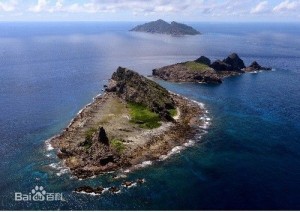China and Japan Agreed to Shelve Diaoyu Islands Dispute: ’82 Suzuki-Thatcher Files
 This is yet another revelation about the decision to leave aside differences over the Diaoyu Islands that then Chinese Premier Zhou Enlai and Japanese Prime Minister Tanaka Kakuei’s agreed on as a condition to normalize relations in 1972. Soon after, however, the Japanese Foreign Ministry managed to expunge this seemingly insignificant yet vitally important fact from the official record and has since denied it ever existed. (Senkaku is the Japanese name for the islands)
This is yet another revelation about the decision to leave aside differences over the Diaoyu Islands that then Chinese Premier Zhou Enlai and Japanese Prime Minister Tanaka Kakuei’s agreed on as a condition to normalize relations in 1972. Soon after, however, the Japanese Foreign Ministry managed to expunge this seemingly insignificant yet vitally important fact from the official record and has since denied it ever existed. (Senkaku is the Japanese name for the islands)
The Japanese Foreign Ministry bureaucracy is well known for being obstinate over sovereignty issues despite the inclinations and wishes of elected politicians like Tanaka. Near the end, the article says Japan incorporated the islands through “lawful means” in 1895 after it ascertained there was no control over them. What it fails to mention is the Japanese annexation occurred at the tail end of China’s defeat in the first Sino-Japanese War of 1894-95 which the Chinese determined as illegal.
At the start of the 21st Century, the tail that wags the Japanese dog, ultra-nationalist politician Ishihara Shintaro campaigned to buy the islands from its private owners, which effectively broke the status quo and infuriated the Chinese. Then, the Japanese government got into the fray (claiming its hand was forced by Ishihara) by nationalizing the islands which was the last straw for China. The result is the ongoing tension between the two countries.
Japan just couldn’t leave it alone!
The Suzuki-Thatcher conversation is just a small vignette of the goings-on at the Foreign Office from a virtual mountain of documents released this month after 30 years of secrecy maintained at the British National Archives. (See yesterday’s post on the Thatcher government’s attitude toward Hong Kong and mainland China following agreement with Deng Xiaoping on the handover. The British are a cynical bunch!)
———-
Japan and China agreed to maintain the status quo on the Senkaku Islands and avoid any discussion over their respective sovereignty claims, the late Prime Minister Zenko Suzuki was quoted as saying in a 1982 conversation with his then British counterpart, Margaret Thatcher, according to British government files released Tuesday.
The disclosure was made in a record of a private conversation that took place Sept. 20 of that year between then Prime Minister Suzuki and Thatcher. According to the record, Suzuki offered advice to Thatcher on how she should handle the Chinese in negotiations over Hong Kong, then a British territory. The document, prepared by Thatcher’s private secretary, notes, “His (Suzuki’s) advice to the prime minister was to deal directly with (Chinese leader) Deng Xiaoping on the matter, with as few other people present as possible.
“This advice was based on his experience of dealing with the disputed territory of the Senkaku Islands on which, when dealing directly with Deng, he had easily reached agreement that the two governments should co-operate on the basis of their major common interest and leave aside the differences of detail: in consequence it had been agreed that, without raising the matter concretely, the status quo should be maintained, so that the issue was effectively shelved.
“The prime minister welcomed Mr. Suzuki’s advice on the method to deal with Deng, but commented that in the case of Hong Kong it would not be sufficient to shelve the issue if the confidence of investors in Hong Kong was to be maintained.” Also attending the meeting with Thatcher was Yoshio Sakurauchi, at that time foreign minister, and Kiichi Miyazawa, then chief Cabinet secretary and later a prime minister.
In May 1979, as a Lower House politician, Suzuki met Deng in China. This is thought to be the meeting referred to in his discussions with Thatcher. The website of the Foreign Ministry in Tokyo states, “Japan has consistently maintained that there has never been any agreement with China to ‘shelve’ issues regarding the Senkaku Islands. This is made clear by published diplomatic records. “The assertion that such an agreement exists directly contradicts China’s own actions to change the status quo through force or coercion.”
In an effort to bolster its sovereignty claims, Tokyo continues to maintain that there is no territorial dispute over the Senkakus. However, over the years there have been several reports suggesting that both Japan and China have been keen to put the issue on ice and instead focus on building diplomatic and trade ties.
The Senkakus are a small group of uninhabited islets in the East China Sea. In January 1895, Tokyo incorporated the islands into Japanese territory by lawful means after, according to the Foreign Ministry, “having carefully ascertained that there had been no trace of control over the Senkaku Islands by another state prior to that period.”
– Kyodo News Service

0 Comments
Trackbacks/Pingbacks